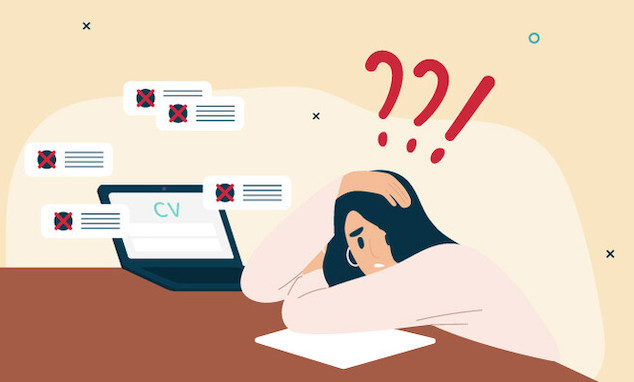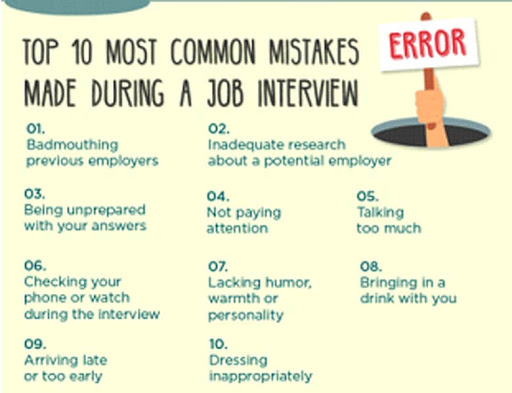
Can’t understand why you didn’t get the job offer? Check the common rejection reasons for candidates in our guide and fill the gaps.
Job search is often an unpredictable process. You might think you sparked interest in your candidacy at the application stage and even presented yourself well during the interview. However, despite your best efforts, you still didn’t get the job. It is a sticky but common situation. In this case, you can either blame everything on bad luck or take an unbiased look at yourself and your mistakes, thereby increasing your future chances of getting hired. In this guide, we will help you with the latter and discuss why you didn’t get the position you wanted.
Why You Are Not Getting Job Offers
In a perfect scenario, the question “Why didn’t I get the job?” must be addressed to the recruiter. However, LinkedIn’s research shows that only 41% of candidates receive feedback upon rejection. If the company did not provide it to you, you have to find out the reasons yourself. It’s in your best interests because the sooner you identify your weaknesses, the sooner you can fix them. To simplify your task, we have collected the most common reasons why candidates don’t get hired.
1. Low awareness of the company
Suppose all you know about the company to which you are applying is its available vacancy. In that case, even your chances of getting an interview are significantly low, not to mention getting a job offer. If you have not studied at least the company’s fast facts, you can hardly customize your application documents and answer why you want to unleash your potential there. It is your direct path to weeding out. The employer must see that you want to join their team and make a contribution to their organization. Committed staff members show the best results in the work process.
2. Too confusing resume
Some applicants try to impress a potential employer with their extensive track record. For this purpose, they add to their resume all positions that they have ever held, down to student side jobs. But this tactic has two flaws. First, no one will study your long-read, given the active flow of applicants. Second, not all of the listed roles are valuable and prove your expertise in the chosen industry. Therefore, the employer will most likely think that you are merely wasting their time. In this case, you can forget about the interview invitation.
3. Poor cover letter
If you puzzle over “Why can’t I get hired?” think about the first impression you make in your cover letter. Factors that can kill it are:
- Too general. You do not mention the company, do not refer to its mission and values, do not explain what prompted you to choose it.
- A random set of skills. You can list a vast number of strengths, but if none of them is of value for the chosen position, your self-presentation is a failure by default. To avoid this, check out the job-winning cover letter samples at GetCoverLetter.com easy of use builder.
- Copy your resume. You shouldn’t delve into your work history, previous responsibilities, and education. Thus, you repeat your resume and deprive yourself of the opportunity to highlight your other merits, which often leads to not getting a job.
4. Excessive modesty
Even qualified specialists sometimes lack the confidence to declare their professional advantages and prove themselves the very person for the role. Such shyness can play a dirty trick on you during the interview, because if you cannot explain why you are worthy of this position in at least a few words, the employer may doubt your candidacy. That is why talented but humble job seekers are often inferior to silver-tongued candidates with mediocre skills.
5. Lack of qualifications
If you wonder why you didn’t get the job, review the job description and honestly answer whether you met most of the company’s requirements. Sometimes employers are willing to make concessions if the applicant lacks a little experience or skills. But if this gap is too large, no employer wants to risk and entrust important responsibilities to an unqualified employee.
6. Inflated financial requests
Forbes says that many companies cannot afford to meet the high financial expectations of job seekers due to the current global situation, which has led to losses in almost all industries. So if you did not indicate at least a salary range and did not show flexibility in the compensation issue, this most likely influenced the employer’s decision.
Besides, make sure the quoted amount is consistent with your experience and qualifications by looking at the average industry salary for your expertise level. Remember, the company will not overpay for your unjustified ambitions.

7. Complaints about the previous employer
Interviewers often want to determine the reasons for your dismissal or what did not suit you in the previous company or team. Your answers speak volumes. If you reveal the weaknesses of a former employer or put your colleagues in a bad light, you break business etiquette.
Also, try to walk in the interviewer’s shoes and think one step ahead. If a candidate easily maligns a previous employer, where are the guarantees that they will not damage your company’s reputation? So your complaints and brickbats may be the main reason why you are not getting hired.
8. Overqualification
Oddly enough, your advanced professional skills and successful career path in the industry can become barriers to your employment. It usually happens when you apply for a position lower than the previous one or want to join a start-up company after working with a renowned corporation. In these cases, employers believe that the new job will be tedious for you, given your background. As a result, you will leave the company at the next opportunity. To convince them otherwise, explain your choice and motivation in your cover letter.

9. Unacceptable social media content
Business News Daily reports that 70% of employers check job seekers’ pages in social networks during the hiring process or entrust this task to recruiters. Their goal is to understand your environment and interests in the virtual world and make sure that they do not conflict with the company’s values and corporate culture. Therefore, take the advice to revise your posts, comments, and statements on Facebook, LinkedIn, and Twitter before applying for the next role. If anything can undermine your credibility or professional image, consider removing or hiding them. It will help you avoid embarrassing misunderstandings.
10. Wrong questions
Recruiters appreciate when a candidate shows their interest in future cooperation and tries to get valuable insights about the company, position, team, tasks, and so on. Nevertheless, some questions do not play into your hands, but rather spoil the interview’s overall impression.
For example, a question about the salary of other employees proves that you lack tact, interest in early career advancement shows that you rush things, and excessive curiosity about the number of allowed sick days and days off calls into question your reliability as an employee. So when you wonder why I didn’t get the job, remember your dialogue with the interviewer, your questions, and their reactions.
11. Victim stance
Some candidates choose to plead for sympathy through personal circumstances, career failures, unfair lives, and an urgent need for money that prompted them to seek work. They mistakenly believe that this will bring pity from the recruiter and get them closer to the desired position. But this move will not bear fruit. First, a recruiter is a professional who clearly distinguishes between emotions and business. They may sympathize with you but not hire you.
Moreover, this is typical toxic behavior. If the candidate adheres to it now, they will most likely transfer it to the company. An employee with constant complaints, problems, and excuses is definitely not valuable to the team. Therefore, if you recognize yourself in this description, urgently change your approach.

12. Unkempt appearance
Surely your clothes, shoes, and hairstyle do not prove your professionalism. Nevertheless, a wrinkled shirt, a ketchup stain on a blouse, unshaven or scruffy beard or unkempt nails negatively affect the same notorious first impression. Details like these discredit your responsible approach to job interviews. Besides, suppose the might-have-been position meant working with people on behalf of the company. In that case, the company was probably afraid that your untidiness as its representative could ruin their reputation.
Wrap Up
Rejection is an integral part of the job search for most jobseekers as the employer tries to get the best deal just like you do. Therefore, if you did not get the desired job, this is not a reason to doubt your strengths, and even more so to give up. However, if you want to succeed in future selection processes, you must understand and, importantly, accept your mistakes. In this guide, we discussed the common reasons for applicant failure. If at least one rings the bell, this is an occasion to direct all efforts to correct it. Remember, any positive change in your life begins with you.






